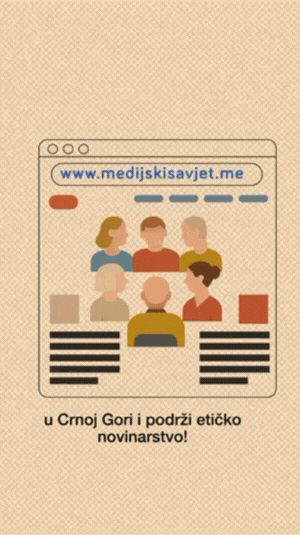Journalistic codes of ethics are not outdated - they have gained a new role and mission in the digital environment. Due to the challenges of information disorder, journalists must continually improve their fact-checking skills, adhere to ethical standards, and promote media literacy. This was stated at a press conference organized by the OSCE Mission to Montenegro and the Technical Working Group for Self-Regulation, where the handbook “Information Disorder in Media Reporting” was presented.
The Deputy Head of the OSCE Mission to Montenegro, Giovanni Gabassi, said that citizens need to be better informed about the mechanisms and ways in which they can file complaints against articles or reports that violate the journalistic code of ethics.
“The Mission is absolutely committed to strengthening self-regulatory mechanisms in Montenegro. We know that the media are key to proper reporting. This year we will begin revising the Code of Journalists of Montenegro, which will serve as a guide for future work,” Gabassi said.
He emphasized the growing risk of information manipulation, particularly regarding freedom of speech.
“The media are essential in analyzing and recognizing the value of the information we are exposed to every day,” Gabassi noted.

Member of the Technical Working Group, Mihailo Jovović, stressed that the handbook is intended for those who seek the truth.
“When considering whether to debunk false information, it is necessary to assess the harm such information causes to society. Another problem is the frequent uncritical sharing of news from social media. Public figures, including politicians and government or local officials, often no longer respond to journalists’ questions - instead, they post their views on X, Facebook, or Instagram. The media then share these posts, and these individuals no longer feel the need to answer difficult questions, which are becoming increasingly rare,” Jovović said.

According to him, a key recommendation is that journalists must constantly improve their fact-checking skills.
“A journalist should always verify the authenticity and credibility of a source before using and publishing information. If you decide to engage in debunking, check whether a fact-checking organization has already addressed the issue - that saves time. The key is for journalists to keep improving and always adhere to ethical standards. They should also promote media literacy among their audiences,” Jovović added.
He explained that special care must be taken to ensure that debunking does not further spread false information.
“There are recommendations on how to do this properly. The language of such articles must be very clear and precise, avoid unnecessary repetition of false claims, and provide context and detailed information on how they arose, who is spreading them, how, and why, and what the consequences are. If someone sends or publishes information where part of it is true, there is always the dilemma of what to do with the rest and what the source’s motive is,” Jovović said.
He stressed that journalists should always consider whether professional standards are being violated, whether the context is accurate, whether important details are omitted, whether someone’s privacy is being infringed, and whether a campaign is involved.
Member of the Technical Working Group, Ilija Jovićević, explained that the daily development of information technologies sometimes leads to neglecting the code of ethics, even though its importance in today’s digital environment is greater than ever.
“All codes in the region, except for Serbia’s, are outdated and have not sufficiently kept up with these changes. We will revise our code this year. All principles can be summarized in three areas: defending freedom of expression, ensuring journalists’ autonomy, seeking the truth, and protecting human integrity and dignity. But the first and primary obligation of journalism remains the truth - and reporting it is never easy, as truth is always a complex concept,” Jovićević said.

Truth, he noted, becomes the measure not only of professional and ethical journalism but also of information disorder.
“We must always report in the public interest and distinguish between the public interest and the public’s curiosity,” Jovićević stressed.
He added that it is important to differentiate between reliable and credible sources and to verify them continuously.
“Even two independent sources are sometimes not enough - additional sources are needed,” he said.
He explained that some people lie intentionally to deceive, while others do so because they themselves have been deceived.
“Sometimes journalists unknowingly pass along information they believe to be true. But the codes clearly state that relaying false information does not excuse the media. There is no justification for that,” Jovićević emphasized.
He noted that journalistic codes are far from obsolete - rather, they have gained a new role and mission, and everything that applies to traditional media applies to new media as well, perhaps even more so.
Member of the Technical Working Group, Ranko Vujović, explained that the handbook addresses disinformation for journalists and media in Montenegro and provides guidelines on how to deal with it.
“I believe this is the first document of its kind in our country. Regarding self-regulation in Europe, we researched what European self-regulatory bodies have done on this topic and how they combat disinformation. At the self-regulation level, nothing has been done in Europe - there is still nothing in European codes on this issue,” Vujović said.

In recent years, he added, Europe has focused on legislation and legal measures in an attempt to combat disinformation.
“We view disinformation as a negative phenomenon, but what we heard last weekend is that disinformation is not necessarily bad. This is a message coming from high political levels, and it will cause major global controversy,” Vujović remarked.
Member of the Technical Working Group, Aneta Spaić, explained that disinformation as a propaganda tool is more characteristic of alternative media spaces - which are part of our everyday life - rather than of professional, established media. This, she said, is why the EU saw the need to address harmful and illegal online content through the Digital Services Act of 2023, followed in 2024 by the Media Freedom Act.

“When disinformation appears and major online platforms detect harmful or illegal content, if the information comes from a registered media outlet, the decision to remove the content is first communicated with the media outlet itself. If the media disputes the classification of the content as disinformation, a dialogue process begins between the platform and the media. If no agreement is reached, the European Regulators Group is notified, and an out-of-court settlement process begins. All this takes place within urgent deadlines - up to 24 hours - during which communication occurs between platforms and the media that published the content deemed an information disorder or harmful content,” Spaić explained.
The authors of the publication are: Aneta Spaić, Mihailo Jovović, Ilija Jovićević, Ranko Vujović, Paula Petričević, and Ljiljana Minić.

Under the auspices of the OSCE Mission to Montenegro, the Technical Working Group for Self-Regulation brings together representatives of various media self-regulatory bodies in Montenegro, including the Media council for self-regulation, as well as ombudspersons and representatives of Dan, Vijesti, and Monitor











